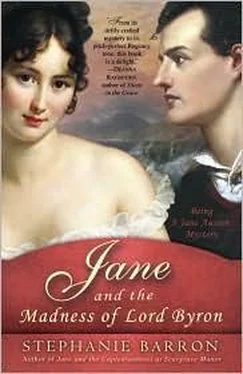And then, about line seven hundred and sixty-five, as best I might judge, I stopped dead—and reread the verse, my heart pounding.
I had not mistaken; it was there, buried in the middle of The Giaour , as Byron had shaped it in his gaol—an accusation of murder. In his poem, he had all but named Catherine Twining’s killer.
I stared at the lines, wavering in the candle-flame, and felt a cold dread. Then I began, unthinkingly, to bundle the pages together—as tho’ by squaring the edges I might make sense of them. It was well after midnight; would Henry be asleep? Or if I braved the draughty passage of the inn, would he open his bedchamber door? I had a decided need for human conversation—and the counsel of my brother.
Outside, in the darkened street below, there was a sudden chaos of shouting, and the cantering of a horse—unusual for Brighton of a Friday, when no Assembly was held and most of the world established at card tables or private parties. Obeying instinct rather than reason, I hastened to the window and threw up the sash.
“Murderer!” the messenger on horseback was shouting as he galloped towards the Marine Pavilion. “Byron the murderer has escaped!”
Chapter 31 Poetic Justice
SATURDAY, 15 MAY 1813
BRIGHTON, CONT.
“HENRY!”
I stood in the private parlour that divided my bedchamber from my brother’s, holding aloft a fresh candle—the one I had employed for reading being almost guttered—and knocked at his door. “ Henry !”
After an interval, he peered out, looking rather absurd, as I thought, in his nightcap and silk robe. I should rather it had been flannel, tho’ in general I despise the stuff—there is something profoundly comforting and home-like about flannel.
“Did you hear the messenger?”
“What messenger?”
He groped towards one of the parlour’s chairs, eyes still blinded with sleep; he had not wasted so much time as to light a candle.
“In the street below. A mounted rider—from Brighton Camp, as I presume, and bound for the Regent’s people. Byron has escaped!”
“Oh, Lord .” Henry rubbed ineffectually at his head, loosing the cap and raking his grey hair into tufts. “He’ll have the whole country roused against him now! Men on foot with torches and dogs, constabulary horsed—and Byron cannot even run! What is the fool about, to be limping towards liberty?”
“I only hope that he did not employ Mona’s pen-knife in his escape,” I fretted, “for she should never forgive herself.”
“Mona’s pen—? No, do not explain—I should rather remain in ignorance,” Henry said. “But consider, Jane, how ill-advised—Flight cannot impress the magistrate with his lordship’s innocence!”
“I think it may be guilt Byron prefers,” I said frantically. “A murderous aspect—particularly when it is assumed in the name of Justice—appears so much more romantic than a helpless one.”
“What are you talking of, Jane?”
“I know where Lord Byron will have gone.”
“If he has any sense, he’ll have stolen a horse and raced up the London road by now.”
“That is exactly where he shall not go. He means to avenge Catherine Twining’s murder—like the Giaour of his poem.”
“The what?” Henry demanded blankly.
“Never mind.” I thrust the telling sheet of paper into Henry’s hands. “Read this—and be so good as to put on your clothes. I mean to thwart his lordship, and I cannot go out in the dead of night alone.”
MORE THAN OURSELVES WERE ABROAD BY THE TIME MY brother roused the Castle’s porter, and pled with the bewildered fellow to unbolt the door. The lackey would not promise to wait up for our return, until Henry informed him sternly that it was a matter of life and death—and pressed a guinea into his hand. Then we were out into the night.
A party of horsemen were collecting on the Steyne; and as predicted, torches flamed about them, casting a livid glow upon cheek and brow. Rising behind them, the bulk of the Marine Pavilion showed lights in many windows, and the riding stables were also illuminated; was Caro Lamb aware of what had occurred? There was much hallooing and barking of orders from the assembling search party; and some of the common Brighton folk had gathered on foot to observe the bustle. I glimpsed the undergroom, Jem, with his arm about the shoulders of my chambermaid, Betsy—both looking watchful and expectant.
“Wait a moment, Jane,” my brother said. “It would be as well to learn the latest intelligence.”
He crossed swiftly to one of the mounted constables, and conversed with the man briefly; then, with a shrug of his shoulders and a faint laugh, turned back to me.
“It seems his lordship was aided in his escape by a page from the Pavilion, who rode up to the gaol dressed in the Regent’s blue and buff livery,” Henry explained hurriedly. “The boy claimed to bear a reprieve for Byron, direct from His Royal Highness—and the sentries, upon reading it, released his lordship immediately. It was only once the Camp Commandant learnt what had occurred, and demanded to see the paper, that the Regent’s signature was perceived to be a forgery. By that time, of course, the two had cantered away.”
“Caro Lamb!” I exclaimed. “That is entirely like her! She should commit every crime in the Kingdom to save her Genius—and never give two snaps of her fingers for what the Law might say.”
“But to forge the Regent’s signature,” Henry returned in tones of shock, “must be a treasonous offence.”
“She should argue, with complete sang-froid , that to do anything less should be traitorous to the dictates of her heart —and might even win clemency from a Prince who saw fit to marry two women bigamously. But enough about Caro—We must hurry , Henry, or it shall be too late.”
As we achieved Church Street, I observed Scrope Davies’s lodgings to be as well-lit as tho’ for a ball. That would be, no doubt, where the little page in blue and buff would be regaling her court with her adventures. No doubt Caro had expected a flight by water, in Byron’s yacht, perhaps—the two of them sailing romantically out into the darkened sea, their destination Greece or Turkey. It had not turned out like that; but then, Caro’s plans rarely bore fruit, and never corresponded to the elaborate phantasies she spun. She would be busy already, I guessed, at spinning another—
We were bound for a different abode, one that stood still shuttered in darkness, but for the faint glow emanating from a side window, that suggested one was awake, and keeping vigil at the house’s rear—
Henry strode up the path to General Twining’s door, and pounded on the oak. To our surprize, it gave way with a reverberating shudder—it had been ajar, and trembled on its hinges. My brother glanced at me wordlessly; I nodded, and he stepped across the threshold. The entry hall was in darkness.
“General Twining!” Henry called.
“Suddley?” I attempted.
No answering voice came. But there were footfalls—a curious, sickening, dragging gait that betrayed the club foot. It was approaching us.
I clutched at Henry’s sleeve.
He groped, in turn, for a taper that ought to lie on the entry hall table. But there was no way to light it.
A dark head, faintly backlit by the pale glow spilling over the threshold of the rear room, appeared suddenly before us; I was reminded of General Twining’s habit of materialising at the far end of the passage. That must be where his book room lay.
“The General will receive you now,” Byron said with a bow, “but do not expect to speak with him overmuch; he is unequal to all explanation.”
Читать дальше












